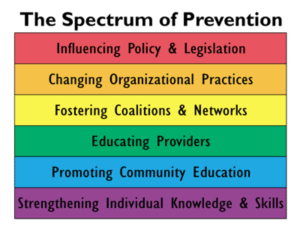By Jenny Rea, Ph.D.
 Did you know… 25% of active-duty spouses reported food insecurity in 2021? The 2021 Survey of Active Duty Spouses found that 27% of families with children under six experienced food insecurity. Among this same group of active-duty spouses, 41% were unemployed.
Did you know… 25% of active-duty spouses reported food insecurity in 2021? The 2021 Survey of Active Duty Spouses found that 27% of families with children under six experienced food insecurity. Among this same group of active-duty spouses, 41% were unemployed.
These findings echo those mentioned in Noelle Harden’s (Health and Nutrition Educator, University of Minnesota Extension) recent blog post. Noelle provided an overview of nutrition security within the military community and mentioned the Spectrum of Prevention. She stated that the Spectrum of Prevention could help military family service providers move from analyzing the problem to taking action.
What is the Spectrum of Prevention?
The Spectrum of Prevention is a broad framework that includes six strategies. Each strategy takes into account the multiple social determinants of health. When used together, the six strategies can produce greater effectiveness and improve prevention initiatives. Moving beyond the idea that prevention is merely education, the framework provides a comprehensive approach to tackle current public health issues, such as food insecurity. For example, the Spectrum has been used nationally in prevention initiatives targeting traffic safety, violence prevention, and nutrition, to name a few.

Consider these three examples illustrating how the Spectrum can be used as an approach to tackle food insecurity in military families.
- Influencing Policy and Legislation: Service providers might develop strategies to increase advocacy efforts to expand eligibility criteria for the WIC Program among military families. In doing so, this could provide healthy food options to more lower-earning families in the military community.
- Fostering Coalitions and Networks: Various service providers, educators, and diverse community organizations could come together to reduce the barriers for military families to access nutritious food. In doing so, they might produce a calendar featuring photos of military families who overcame food insecurity.
- Educating Providers: Staff on and off military installations could receive training to identify signs of food insecurity and encourage families to seek immediate assistance.
The Spectrum of Prevention can help coordinate the efforts of different groups working on the same issue. The Spectrum provides a framework and common language for people from diverse backgrounds to come together, share information, highlight gaps in service, and develop joint plans to achieve public health outcomes.
Want to Learn More? Read Noelle’s blog post and register for her May 24th webinar: Supporting Nutrition Security for Military Families through a Multilayered Approach.
Take advantage of OneOp’s Food Security in Focus collection and register for a free webinar today!
References
Check out this resource for specific definitions of each of the six strategies within the Spectrum of Prevention: https://www.preventioninstitute.org/sites/default/files/uploads/1PGR%20Spectrum%20of%20Prevention.pdf
- Cohen, L., & Swift, S. (1999). The spectrum of prevention: Developing a comprehensive approach to injury prevention. Injury Prevention, 5, 203-207.
- Military OneSource. (2023, February). 2021 Food Security Among Active Duty Spouses. Retrieved from https://www.militaryonesource.mil/data-research-and-statistics/survey-findings/2021-spouses-survey/
- Rattray, T., Brunner, W., & Freestone, J. (2022, April). The New Spectrum of Prevention: A Model for Public Health Practice.
- USDA Food and Nutrition Service. (2013). About WIC: How WIC Helps. Retrieved from https://www.fns.usda.gov/wic/about-wic-how-wic-helps
About the Author
 Jenny Rea, Ph.D., is a military spouse and mom of four kiddos under six years. Jenny is a consultant with OneOp, an Assistant Professor of Practice in the Department of Human Services, and a Director of the Certificate in Military Families at the University of Arizona.
Jenny Rea, Ph.D., is a military spouse and mom of four kiddos under six years. Jenny is a consultant with OneOp, an Assistant Professor of Practice in the Department of Human Services, and a Director of the Certificate in Military Families at the University of Arizona.














